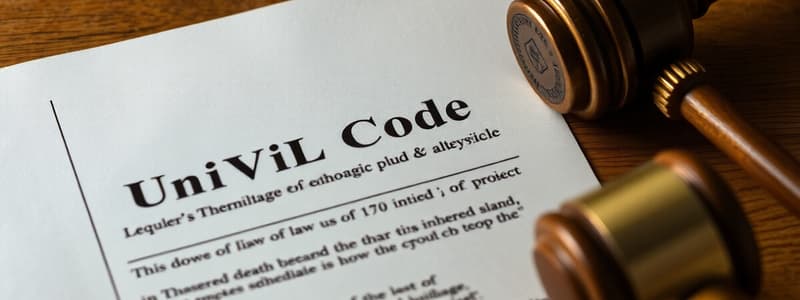Podcast
Questions and Answers
Which of the following personal laws is the Uniform Civil Code (UCC) expected to unify?
Which of the following personal laws is the Uniform Civil Code (UCC) expected to unify?
- Personal laws related to marriage, divorce, inheritance, and adoption (correct)
- Economic laws
- Criminal laws
- Environmental laws
Which Directive Principle of State Policy (DPSP) in the Indian Constitution mentions the need for a Uniform Civil Code?
Which Directive Principle of State Policy (DPSP) in the Indian Constitution mentions the need for a Uniform Civil Code?
- Article 44 (correct)
- Article 51
- Article 48
- Article 38
Which of the following religions would be affected by the implementation of the Uniform Civil Code in India?
Which of the following religions would be affected by the implementation of the Uniform Civil Code in India?
- Hinduism
- Islam
- Christianity
- All of the above (correct)
Which Indian state has a functioning Uniform Civil Code based on the Portuguese Civil Code of 1867?
Which Indian state has a functioning Uniform Civil Code based on the Portuguese Civil Code of 1867?
Which year marked the official inclusion of the Uniform Civil Code in the Directive Principles of State Policy in the Indian Constitution?
Which year marked the official inclusion of the Uniform Civil Code in the Directive Principles of State Policy in the Indian Constitution?
In which landmark case did the Supreme Court of India first express the need for a Uniform Civil Code?
In which landmark case did the Supreme Court of India first express the need for a Uniform Civil Code?
What is the main constitutional argument for implementing the UCC in India?
What is the main constitutional argument for implementing the UCC in India?
Which Law Commission report explicitly stated that the UCC is not necessary at the current stage but reforms in personal laws should be gender-just?
Which Law Commission report explicitly stated that the UCC is not necessary at the current stage but reforms in personal laws should be gender-just?
What is one of the major challenges in implementing the Uniform Civil Code?
What is one of the major challenges in implementing the Uniform Civil Code?
Which Article of the Indian Constitution guarantees the right to freedom of religion, which some argue could be impacted by UCC?
Which Article of the Indian Constitution guarantees the right to freedom of religion, which some argue could be impacted by UCC?
The Supreme Court, in the Sarla Mudgal case, dealt with which aspect related to the Uniform Civil Code?
The Supreme Court, in the Sarla Mudgal case, dealt with which aspect related to the Uniform Civil Code?
Which of the following is an argument in favor of implementing the Uniform Civil Code?
Which of the following is an argument in favor of implementing the Uniform Civil Code?
Which fundamental right is often cited as potentially conflicting with the implementation of a Uniform Civil Code?
Which fundamental right is often cited as potentially conflicting with the implementation of a Uniform Civil Code?
Which Prime Minister of India strongly advocated for the implementation of the Uniform Civil Code?
Which Prime Minister of India strongly advocated for the implementation of the Uniform Civil Code?
The debate over the UCC often revolves around which of the following personal laws in India?
The debate over the UCC often revolves around which of the following personal laws in India?
Flashcards are hidden until you start studying
Study Notes
Uniform Civil Code (UCC) in India
- Definition: The Uniform Civil Code (UCC) aims to unify personal laws related to marriage, divorce, inheritance, and adoption across all religions in India.
- Constitutional Basis: Article 44 of the Indian Constitution includes the UCC as a Directive Principle of State Policy, advocating for its implementation.
- Religious Impact: The UCC would affect all religions in India including Hinduism, Islam, Christianity, and others.
- Goa's Example: Goa is the only state in India with a functioning UCC based on the Portuguese Civil Code of 1867.
- Inclusion in Constitution: The UCC was formally added to the Directive Principles of State Policy in the Indian Constitution in 1950.
- Supreme Court's Stance: In the 1985 case Mohammad Ahmed Khan vs. Shah Bano Begum, the Supreme Court first recognized the need for a UCC.
- Argument for Implementation: The primary constitutional argument for implementing the UCC is its potential to promote gender justice and equality by replacing discriminatory personal laws.
- Law Commission's Position: The 21st Law Commission Report emphasized the need for gender-just reforms within personal laws while concluding that imposing a UCC was unnecessary at that time.
- Challenges to Implementation: India's socio-cultural and religious diversity poses a significant challenge to implementing a single, unified legal framework for personal matters.
- Right to Freedom of Religion: Article 25 of the Indian Constitution guarantees freedom of religion, which some argue could be jeopardized by the UCC.
- Sarla Mudgal Case: The Supreme Court in the Sarla Mudgal case addressed the misuse of religious conversion to avoid monogamy and its implications for the UCC.
- Arguments for UCC: Proponents of the UCC argue that it would promote national integration and equality.
- Fundamental Rights Debate: The right to freedom of religion (Article 25) is frequently seen as potentially conflicting with the UCC.
- Prime Ministerial Support: Prime Minister Narendra Modi has strongly advocated for the implementation of the UCC.
- Focus on Personal Laws: The debate surrounding the UCC largely centers on reforming personal laws dealing with marriage, divorce, and inheritance.
Studying That Suits You
Use AI to generate personalized quizzes and flashcards to suit your learning preferences.

![Uniform Civil Code - Challenges, Suggestions & Debate [UPSC Notes]](https://images.unsplash.com/photo-1515879218367-8466d910aaa4?crop=entropy&cs=srgb&fm=jpg&ixid=M3w0MjA4MDF8MHwxfHNlYXJjaHwyfHxVbmlmb3JtJTIwQ2l2aWwlMjBDb2RlJTJDJTIwVVBTQyUyME5vdGVzJTJDJTIwSW5kaWFuJTIwQ29uc3RpdHV0aW9uJTJDJTIwZGViYXRlfGVufDF8MHx8fDE3MTE1NzA2MDh8MA&ixlib=rb-4.0.3&q=85&w=300&fit=crop&h=200&q=75&fm=webp)

